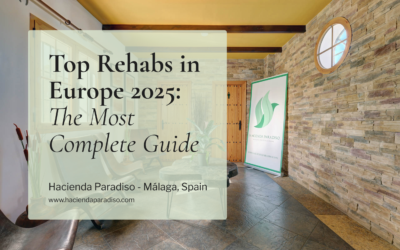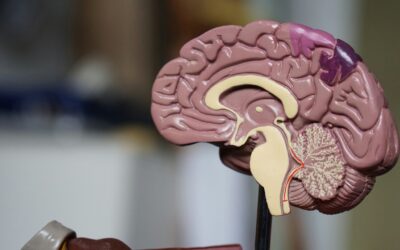Last updated: November, 2025
Mindfulness is more than a wellness trend: it is a clinically supported therapeutic practice that helps restore calm, focus, and self-awareness. By learning to observe thoughts and emotions without judgment, individuals can reduce stress, manage cravings, and respond to challenges more intentionally.
In the context of addiction recovery and mental health, mindfulness helps retrain the brain’s emotional and reward systems, making recovery not only possible but sustainable. At Hacienda Paradiso, mindfulness is woven into every stage of therapy ( from structured sessions to nature-based practices) supporting individuals in achieving balance, focus, and long-term well-being.
How Mindfulness Benefits Mental Health
Mindfulness directly influences the brain’s stress and emotion-regulation systems. Regular practice has been shown to lower cortisol levels and promote relaxation, helping individuals handle anxiety or intrusive thoughts with greater stability.
It also strengthens emotional regulation: by observing thoughts and sensations without reacting impulsively, people can manage anger, sadness, or fear more effectively. Over time, this builds psychological flexibility: the ability to remain calm and grounded even in difficult situations.
Furthermore, mindfulness enhances self-awareness, allowing individuals to recognize early warning signs or patterns that may lead to relapse. For many, this awareness becomes the foundation of lasting change.
A simple way to begin is through short daily sessions of mindful breathing or guided meditation. Just a few minutes each day can gradually train the mind to pause before reacting and to cultivate a sense of inner steadiness.
Mindfulness and Addiction Recovery
In addiction recovery, mindfulness has been proven to reduce substance use, decrease cravings, and strengthen relapse prevention. Mindfulness-Based Interventions (MBIs) — such as Mindfulness-Based Relapse Prevention (MBRP) — teach individuals to experience urges without automatically acting on them.
A key practice known as urge surfing encourages patients to observe cravings like waves: noticing their rise, intensity, and eventual fall. This non-reactive awareness helps separate the craving from behavior, reinforcing self-control and confidence.
Mindfulness also supports healthy dopamine regulation by shifting attention toward natural rewards (such as social connection, creativity, and movement) rather than addictive stimuli.
Combining mindfulness with gentle physical activities like yoga, stretching, or walking meditation further enhances its effects, integrating emotional and physical balance throughout the recovery process.
Key Mindfulness Techniques for Recovery
There are many ways to practice mindfulness, each adaptable to different stages of healing. Common techniques include:
- Mindful Breathing: Focus on the breath, observing inhalation and exhalation to anchor attention in the present moment.
- Body Scan: Slowly move awareness through different parts of the body, noticing tension or sensations with curiosity rather than judgment.
- Guided Meditation: Follow therapist-led or audio sessions designed to build focus, patience, and calm.
- Urge Surfing: Notice cravings as transient experiences, learning to tolerate them without giving in.
- Mindful Walking or Movement: Combine awareness with gentle physical activity to integrate mindfulness into daily life.
These exercises strengthen concentration and resilience while helping individuals reconnect with the body’s natural rhythms. The goal is not to suppress thoughts or emotions, but to relate to them with acceptance and perspective.
Integrating Mindfulness into Daily Life
The effectiveness of mindfulness lies in consistency. Simple, structured routines help weave awareness into daily activities:
- Start the day mindfully: Spend 5–10 minutes each morning in focused breathing or gratitude reflection.
- During therapy: Incorporate brief grounding exercises at the start of individual or group sessions.
- In nature: Practicing mindfulness outdoors enhances sensory awareness and deepens relaxation.
- Through journaling: Reflecting on emotions and sensations observed during mindfulness sessions helps track progress and insight over time.
Recovery is reinforced when mindfulness extends beyond therapy into ordinary moments (eating, walking, listening, or completing chores). Encouraging individuals to pause, notice, and breathe brings mindfulness into real life, transforming everyday experiences into opportunities for healing.
Evidence-Based Benefits of Mindfulness
Scientific evidence strongly supports mindfulness as a therapeutic practice for both mental health and addiction recovery. Research demonstrates that mindfulness:
- Reduces anxiety and depression symptoms across diverse clinical populations.
- Improves cognitive control and executive functioning, helping individuals make more deliberate choices.
- Decreases relapse risk by strengthening self-regulation and emotional stability.
- Enhances overall well-being, quality of sleep, and life satisfaction.
At Hacienda Paradiso, mindfulness complements psychotherapy, medication management, and nature-based routines. This integrated approach nurtures self-awareness and mental clarity, allowing residents to build calm, focus, and resilience: the foundations of lasting recovery.
The Path Toward Healing
Mindfulness is both a practice and a mindset — a way of relating to the present with openness, curiosity, and compassion. Within the context of recovery, it helps individuals regain agency over their thoughts and emotions, transforming automatic reactions into conscious responses.
At Hacienda Paradiso, mindfulness sessions are combined with clinical therapy and natural surroundings to support complete healing. Residents learn that recovery is not about control, but about awareness: a quiet strength that grows with every breath. Through consistent practice, emotional balance and peace of mind become not temporary goals, but sustainable ways of living.
Frequently Asked Questions: Mindfulness and Recovery
Mindfulness in therapy refers to cultivating present-moment awareness without judgment. It helps individuals notice thoughts, emotions, and physical sensations as they arise, allowing them to respond more calmly rather than react impulsively. In therapeutic settings, mindfulness is used to enhance self-awareness, reduce anxiety, and improve emotional regulation. Over time, this practice supports better mental health, focus, and stress management, essential elements for addiction recovery and personal growth.
Mindfulness teaches people to observe cravings and emotional triggers without immediately acting on them. This awareness interrupts the automatic cycle of craving → reaction → guilt. By learning to pause and breathe, individuals build tolerance for discomfort and make more deliberate choices. Studies show that mindfulness-based relapse prevention significantly reduces substance use and strengthens long-term recovery outcomes, particularly when combined with therapy and holistic treatment.
Mindfulness is a powerful complement, not a replacement, for clinical therapy or prescribed medication. It enhances the effectiveness of both by promoting relaxation and self-awareness. For many individuals, combining mindfulness with therapy improves treatment adherence and emotional balance. At Hacienda Paradiso, mindfulness is integrated with evidence-based approaches such as cognitive-behavioral therapy (CBT) to ensure comprehensive care and safety.
Start small. Spend five minutes each day focusing on the breath, noticing each inhale and exhale without judgment. Gradually increase the time as comfort grows. Guided meditations or therapist-led sessions can provide structure and support. Consistency is more important than duration: even brief daily practice can lower stress levels and improve focus over time. Engaging in mindful walking, yoga, or journaling further helps bring mindfulness into everyday life.
Mindfulness aligns perfectly with Hacienda Paradiso’s holistic philosophy. The serene natural setting, daily routines, and therapeutic guidance all reinforce mindful living. Each programme incorporates mindfulness exercises to reduce stress, promote emotional stability, and encourage connection with the present moment. This integration helps residents restore calm, rebuild confidence, and experience recovery as a process of awareness and balance rather than control or suppression.










